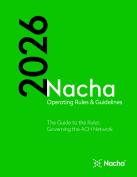Limitation on Warranty Claims

Overview
This rule limits the length of time in which an RDFI is permitted to make a claim against the ODFI’s authorization warranty.
The Warranty Claims Tool was developed to help Receiving Depository Financial Institutions (RDFIs) better understand the timeline of when they can return transactions or may file a Warranty Claim against the Originating Depository Financial Institution (ODFI) for certain transactions.
Details
This rule limits the length of time in which an RDFI is permitted to make a claim against the ODFI’s authorization warranty.
For an entry to a non-consumer account, the time limit is one year from the settlement date of the entry (analogous to one-year rule in UCC §4-406 that applies to checks and items charged to bank accounts).
For an entry to a consumer account, the limit covers two time periods:
The first ninety-five (95) calendar days from the settlement date of the first unauthorized entry to the consumer’s account will always be covered (i.e., the first 95 days).
- This period covers the time period in Regulation E in which an RDFI may be liable to a consumer for errors for 60 days from the transmittal of an account statement that shows the first error.
If outside the first 95 days, then two years from the settlement date of the entry (i.e., the last two years).
- This period exceeds the one-year Statute of Limitations in the Electronic Funds Transfer Act (covering Regulation E claims), which runs from the date of the occurrence of the violation, which may be later than the settlement date of the transaction.
- This also allows for “extenuating circumstances” in which a consumer is delayed from reporting an error to his or her financial institution.
Impact
Benefits
Addresses a friction point for many ACH participants
-
For ACH Originators, by limiting the length of time in which an ACH payment can be charged back
-
For ODFIs, by providing greater certainty regarding long-term return of transactions and associated credit risk
-
For RDFIs, by providing greater clarity regarding situations in which claims are allowed; and helping RDFI to establish reasonable expectations with their customers
Lowers a barrier to ACH origination for potential ODFIs and Originators, as it creates more certainty for transaction liability
Establishes a more equitable allocation of liability – Receivers have a responsibility to review statements and report unauthorized activity in a timely manner
Lessens the impact of “friendly fraud”
RDFIs generally will still be enabled to recover amounts they must pay consumers under Regulation E
Impacts
-
Shifts liability for some older transactions from ODFIs and Originators to RDFIs and Receivers
-
Small increase in risk that there will be some circumstances in which an RDFI could be liable to its customer without the ability to collect from the ODFI; associated RDFI courtesy write-offs
-
Having two different time periods covered for entries to consumer accounts can cause confusion
-
May be viewed as less consumer friendly
FAQs Section
Does this rule extend or have any impact on the ACH network’s return time frame for unauthorized debits?
No. An RDFI may return any unauthorized debit within the appropriate return time frame.
An RDFI returning an unauthorized debit to a consumer account must continue to do so in such time and manner that such an entry is made available to the ODFI no later than the opening of business on the banking day following the 60th calendar day following the settlement date of the original entry. A Written Statement of Unauthorized Debit is required for these returns.
An RDFI returning an unauthorized debit to a non-consumer account must transmit the return in such time and manner that the return entry is made available to the ODFI no later than the opening of business on the second banking day following the settlement date of the entry.
How will the upcoming changes impact the warranties under the Nacha Operating Rules?
Currently, the warranty language in the Rules is broad and does not limit itself to the time frame for automated returns. As a result, the ODFI’s potential liability under the Rules is limited only by the statute of limitations for breach of contract claims under the applicable state law.
As of June 30, 2021, the Rules will expressly limit the time in which an RDFI may make a claim against the ODFI’s authorization warranty.
Under the revised rules, how long will an RDFI have to make a claim against an ODFI for an unauthorized debit to a consumer account?
With respect to an unauthorized debit entry to a consumer account, an RDFI may make a claim against the ODFI for two covered time periods:
Two years from settlement
An RDFI may make a claim against the ODFI for a specific unauthorized debit Entry to a consumer account within two years from the Settlement Date of that specific Entry. For example, if an unauthorized debit Entry settles on August 1, 2021, the RDFI will need to make its claim to the ODFI for that specific Entry no later than August 1, 2023.
Where a series of unauthorized debits is involved, the 2-year period applies separately to each individual entry.
The easiest way to understand the impact of this time limit is to say that the RDFI has a two-year "lookback" period for warranty claims for consumer accounts. An RDFI may make a claim against the ODFI's authorization warranty for entries having a settlement date within the most recent two years from the date of the RDFI's claim. Entries with a settlement date more two years from the date of the RDFI's claim will not be eligible for inclusion in a warranty claim against the ODFI, with the exception entries settling within 95 days of the first unauthorized debit, as permitted below.
The First 95 Days
An RDFI may also make a claim for entries settling within ninety-five (95) days from the Settlement Date of the first unauthorized debit to the consumer’s account. This period covers the time period under Regulation E in which an RDFI may be liable to a consumer for errors for sixty days from the transmittal of an account statement that shows the first error.
Under the revised rules, how long will an RDFI have to make a claim against an ODFI for an unauthorized debit to a non-consumer account?
With respect to an unauthorized debit entry to a non-consumer account, an RDFI may make a claim against the ODFI for one year from the Settlement Date of the Entry.
That is to say, the RDFI has a one-year “lookback” period for warranty claims involving entries to a non-consumer account. An RDFI may make a claim against the ODFI’s authorization warranty for entries having a settlement date within one year from the date of the RDFI’s claim. Entries with a settlement date more than one year from the date of the RDFI’s claim are too old to be pursued by the RDFI as a warranty claim.
Does a timely warranty claim by the RDFI guarantee the return of funds from an alleged unauthorized debit entry(ies)?
No. Depending on the specific circumstances, the ODFI may make any one of a number of defenses to deny the RDFI’s claim, including, but not limited to, a defense that the entry was properly authorized. Resolution of the warranty claim will depend on the particular facts and circumstances surrounding the dispute.
Does the Warranty Claim rule impact an RDFI’s obligation to its Receiver regarding an unauthorized debit to the Receiver’s account?
No. While the Warranty Claim rule establishes a limit on the time in which an RDFI may make a claim against the ODFI for an unauthorized debit entry, it does not affect an RDFI’s obligations to its account holder with respect to handling an unauthorized debit to the Receiver’s account. Financial institutions should consult their own legal counsel regarding their obligations to their Receivers under the Nacha Operating Rules and other applicable legal requirements.
What are an RDFI’s obligations to recredit a Receiver for any disputed entry prior to resolution of the warranty claim?
When determining its obligations to recredit a Receiver for a disputed entry, an RDFI must take into account the terms of its agreements, applicable laws, and Regulation E with respect to error resolution procedures and provisional credit obligations. The RDFI should consult its own legal counsel for guidance.
RDFIs should understand that an ODFI may have defenses to the RDFI’s claim and ultimately may not pay the claim, or may not pay immediately, and should take this into account when providing provisional credit to its customer. Nevertheless, the RDFI may make a business decision to compensate its customer for any of the debits based on its customer relationship.
If an RDFI requests proof of authorization from the ODFI and the ODFI provides the requested documentation, may the RDFI still pursue a warranty claim against the ODFI for an entry its customer claims is unauthorized?
Yes. The receipt of documentation from an ODFI in response to a request for proof of authorization does not prevent an RDFI from making a claim against the ODFI’s warranty for an entry the Receiver claims is unauthorized.








